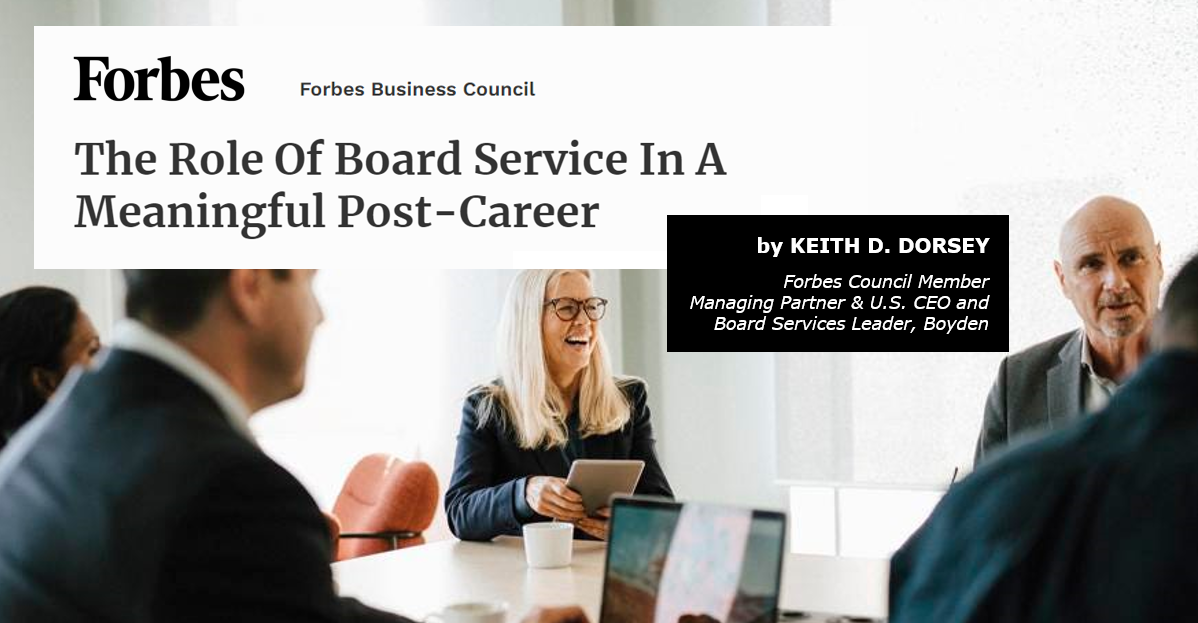This article was originally published by Forbes Business Council. Click here to view the original article.

It might seem like the day will never come, yet the end of your career lurks on the horizon—whether it is five or 35 years in the future. If you’ve contemplated that milestone, you might already be working with an army of advisors such as wealth managers, attorneys and insurance agents who are dedicated to supporting your transition.
As important as the economics of your post-career chapter are, it is only one piece of success in this life stage, as it only helps you afford to leave your career. Two other equally important aspects—a purposeful post-career and a generative post-career—also require your attention.
The importance of purpose is reflected in the ancient proverb: “Without vision, people perish.” Finding purpose is no small task, according to a 2022 study by Edward Jones and Age Wave, a retirement think tank. In this study, 46% of respondents reported struggling to find purpose in their newfound freedom for at least two years after leaving their careers.
I learned from Parker Palmer, in the book Let Your Life Speak, that finding purpose involves deeply listening to your life and trying to understand what it is truly about—separate from what you might want it to be about. If you fail to do that, your life (including your career and post-career) will fall short of what it could be. More recently, Simon Sinek popularized the concept of starting with your “why,” explaining that our "why" transforms our ability to inspire ourselves and others and multiplies our capacity to achieve our goals.
While the need for purpose makes sense to many individuals approaching the end of their careers, there remains a third element essential to a truly successful post-career: a generative outlet. Psychologist Erik Erikson explained that generativity is a normal stage of human psychosocial development when we become concerned with creating and nurturing things that will outlast us. While that can occur through having children, it can also include giving back from our accumulated life and work experience so that others might benefit from and build upon it.
What I believe these three factors—financial resources, purpose and generativity—mean is that the life stage formerly termed "retirement" needs to be redefined as the "post-career," what we do after we grow up or the career after our careers.
For me, a central activity of my post-career is giving back my expertise and guidance through serving on boards of directors. Perhaps you, too, have expert wisdom, perspective, skills and knowledge that only you can offer and want to share with other leaders and companies. Nonprofits, private ventures and public companies all look to their boards of directors to oversee, advise and govern their operations to help them efficiently and effectively serve their stakeholders. In exchange, I've found you can gain a sense of impact, fulfillment and possibly even ongoing income.
But just what is a board of directors? What do they do? And what can you do to explore your own possibilities for board service?
What is a board of directors, and what does it do?
A company’s board of directors is a group of individuals—some from inside and some from outside the company—who are tasked with three overarching activities:
- Oversight: The board assures that management protects shareholders’ interests by monitoring compliance with regulatory requirements.
- Management: Boards provide guidance for strategic changes in the organization (e.g., executive hiring and compensation, corporate strategy and mergers and acquisitions).
- Service: Board members also act as executive advisors for the chief executive and management team.
Although all boards are tasked with oversight, management and service responsibilities, the amount and nature of these activities vary from board to board and are largely influenced by the type of board it is:
- Nonprofit boards focus on raising funds or providing oversight, advisory and management of the nonprofit’s executive director or president. I've observed that board seats often are held by government officials, public employees, executives and aspiring executives, and those early in their leadership careers.
- Private boards focus on accessing funding and providing strategic advice to support the growth of organizations owned by families, private equity firms or venture capital firms. Board seats are typically filled by family members and friends of the family (in family-owned firms), as well as by internal executives, investors and external directors.
- Public boards focus on providing strategic advice, monitoring and governance to support the growth and protect the reputation of publicly traded organizations. Board seats are often held by internal executives and external directors. Compared to private organizations, public organizations serve a larger and more diverse collection of shareholders; therefore, the board needs to help the organization navigate a more complex set of challenges.
Due to the variations in board focus, activities and needs, your experience, competencies and interests might be a great fit for one board but not for another board. Moreover, your development path as an independent director likely will involve serving on nonprofit boards before being ready to serve on private or public boards. Regardless of your particular path, your role as director will require the humble and hands-off attitude reflected in this board member adage: “Noses in, fingers out!”
What should happen next?
Try the following steps to begin exploring whether board service might fit into your post-career:
- Reflect on your career and identify the distinctive competencies you want to carry forward in this next life chapter.
- Consider your level of interest in each board function (i.e., oversight, management and service). How would you allocate 100 points across these three functions to reflect your interests?
- Talk with your colleagues and contacts who currently serve on boards. Learn about their experiences, share your competencies and interests relative to board service, and seek their feedback on developing your own path to board service.
Crafting a fulfilling post-career requires both purpose and planning. If your purpose includes using your unique strengths to benefit others, you might find board service to be a meaningful ingredient in creating your own powerful and self-regenerating legacy.



